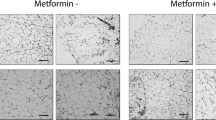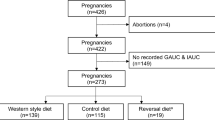Abstract
The mechanistic link between obese parents and obese offspring and the relative role of genes, and a shared environment is not completely understood. Animal models help us to differentiate between genetic and environmental factors, and the interaction between the two. However, the willingness of researchers to blend results from multiple models makes it difficult for clear mechanisms to be identified for specific hypothesis-driven research. As such we conducted a systematic review of animal models of maternal high fat feeding in an effort to identify the affect on the offspring glycaemic control. Maternal and offspring outcomes are reported in an effort to identify possible relationships to facilitate and focus on future research. We present here data from 11 studies investigating glycaemic control in offspring exposed to a high fat diet (HFD) during maternal gestation only or gestation and lactation. Studies in this review identify a real risk of type 2 diabetes and obesity in male offspring exposed to a maternal HFD. Poor glycaemic control in the offspring appears to be independent of maternal obesity, birth weight or post-weaning macronutrient intake. Inconsistencies between studies however, limit our capacity to identify mechanisms for the developmental origin of these diseases in animal models of overnutrition.
This is a preview of subscription content, access via your institution
Access options
Subscribe to this journal
Receive 12 print issues and online access
$259.00 per year
only $21.58 per issue
Buy this article
- Purchase on SpringerLink
- Instant access to full article PDF
Prices may be subject to local taxes which are calculated during checkout

Similar content being viewed by others
References
Whitaker RC, Wright JA, Pepe MS, Seidel KD, Dietz WHD . Predicting obesity in young adulthood from childhood and parental obesity. N Engl J Med 1997; 337: 869–873.
Rising R, Lifshitz F . Lower energy expenditures in infants from obese biological mothers. Nutr J 2008; 7: 15–22.
Moses RG, Luebcke M, Davis WS, Coleman KJ, Tapsell LC, Petocz P et al. Effect of a low-glycemic-index diet during pregnancy on obstetric outcomes. Am J Clin Nutr 2006; 84: 807–812.
Hillier TA, Pedula KL, Schmidt MM, Mullen JA, Charles MA, Pettitt DJ . Childhood obesity and metabolic imprinting - The ongoing effects of maternal hyperglycemia. Diabetes Care 2007; 30: 2287–2292.
Sacks DA, Liu AI, Wolde-Tsadik G, Amini SB, Huston-Presley L, Catalano PM . What proportion of birth weight is attributable to maternal glucose among infants of diabetic women? Am J Ob Gyn 2006; 194: 501–507.
Hales CN, Barker DJP, Clark PMS, Cox LJ, Fall C, Osmond C et al. Fetal and infant growth and impaired glucose-tolerance at age 64. B Med Journal 1991; 303: 1019–1022.
Sugihara S, Sasaki N, Amemiya S, Kohno H, Tanaka T, Matsuura N . Analysis of weight at birth and at diagnosis of childhood-onset type 2 diabetes mellitus in Japan. Ped Diabetes 2008; 9: 285–290.
Muhlhausler BS, Adam CL, Marrocco EM, Findlay PA, Roberts CT, McFarlane JR et al. Impact of glucose infusion on the structural and functional characteristics of adipose tissue and on hypothalamic gene expression for appetite regulatory neuropeptides in the sheep fetus during late gestation. J Physiol London 2005; 565: 185–195.
Shankar K, Harrell A, Liu X, Gilchrist JM, Ronis MJJ, Badger TM . Maternal obesity at conception programs obesity in the offspring. Am J Physiol Reg Integ Comp Physiol 2008; 294: R528–R538.
Koukkou E, Ghosh P, Lowy C, Poston L . Offspring of normal and diabetic rats fed saturated fat in pregnancy demonstrate vascular dysfunction. Circulation 1998; 98: 2899–2904.
Buckley AJ, Keseru B, Briody J, Thompson M, Ozanne SE, Thompson CH . Altered body composition and metabolism in the male offspring of high fat-fed rats. Metabolism 2005; 54: 500–507.
Cerf ME, Williams K, Nkomo XI, Muller CJ, Du Toit DF, Louw J et al. Islet cell response in the neonatal rat after exposure to a high-fat diet during pregnancy. Am J Physiol Reg Integ Comp Physiol 2005; 288: R1122–R1128.
Gregersen S, Underborg Dyrskog SE, Storlien LH, Hermansen K . Comparison of a high saturated fat diet with a high carbohydrate diet during pregnancy and lactation: Effects on insulin sensitivity in offspring of rats. Metabolism 2005; 54: 1316–1322.
Taylor PD, McConnell J, Khan IY, Holemans K, Lawrence KM, Asare-Anane H et al. Impaired glucose homeostasis and mitochondrial abnormalities in offspring of rats fed a fat-rich diet in pregnancy. Am J Physiol Reg Integ Comp Physiol 2005; 288: R134–R139.
Cerf ME, Muller CJ, Du Toit DF, Louw J, Wolfe-Coote SA . Hyperglycaemia and reduced glucokinase expression in weanling offspring from dams maintained on a high-fat diet. Brit J Nutr 2006; 95: 391–396.
Samuelsson AM, Matthews PA, Argenton M, Christie MR, McConnell JM, Jansen EH et al. Diet-induced obesity in female mice leads to offspring hyperphagia, adiposity, hypertension, and insulin resistance: a novel murine model of developmental programming. Hypertension 2008; 51: 383–392.
Bayol SA, Simbi BH, Stickland NC . A maternal cafeteria diet during gestation and lactation promotes adiposity and impairs skeletal muscle development and metabolism in rat offspring at weaning. J Physiol London 2005; 567: 951–961.
Bayol SA, Farrington SJ, Stickland NC . A maternal ′junk food′ diet in pregnancy and lactation promotes an exacerbated taste for ′junk food′ and a greater propensity for obesity in rat offspring. Brit J Nutr 2007; 98: 843–851.
Bayol SA, Simbi BH, Bertrand JA, Stickland NC . Offspring from mothers fed a ‘junk food’ diet in pregnancy and lactation exhibit exacerbated adiposity that is more pronounced in females. J Physiol London 2008; 586: 3219–3230.
Higgins JPT, Green S (eds). Cochrane Handbook for Systematic Reviews of Interventions Version 5.0.2 (Updated September 2009). The Cochrane Collaboration, 2009. Available from www.cochrane-handbook.org.
Downs SH, Black N . The feasibility of creating a checklist for the assessment of the methodological quality both of randomised and non-randomised studies of health care interventions. J Epidemiol Community Health 1998; 52: 377–384.
Howie GJ, Sloboda DM, Kamal T, Vickers MH . Maternal nutritional history predicts obesity in adult offspring independent of postnatal diet. J Physiol London 2009; 587: 905–915.
Tamashiro KLK, Terrillion CE, Hyun J, Koenig JI, Moran TH . Prenatal Stress or High-Fat Diet Increases Susceptibility to Diet-Induced Obesity in Rat Offspring. Diabetes 2009; 58: 1116–1125.
Chen H, Simar D, Lambert K, Mercier J, Morris MJ . Maternal and Postnatal Overnutrition Differentially Impact Appetite Regulators and Fuel Metabolism. Endocrinology 2008; 149: 5348–5356.
Ferezou-Viala J, Roy AF, Serougne C, Gripois D, Parquet M, Bailleux V et al. Long-term consequences of maternal high-fat feeding on hypothalamic leptin sensitivity and diet-induced obesity in the offspring. Am J Physiol 2007; 293: R1056–R1062.
Srinivasan M, Katewa SD, Palaniyappan A, Pandya JD, Patel MS, Srinivasan M et al. Maternal high-fat diet consumption results in fetal malprogramming predisposing to the onset of metabolic syndrome-like phenotype in adulthood. Am J Physiol Endoc Metab 2006; 291: E792–E799.
Dyrskog SEU, Gregersen S, Hermansen K . High-fat feeding during gestation and nursing period have differential effects on the insulin secretory capacity in offspring from normal Wistar rats. Rev Diabet Stud 2005; 2: 136–145.
Guo F, Catherine Jen KL . High-fat feeding during pregnancy and lactation affects offspring metabolism in rats. Physiol Behav 1995; 57: 681–686.
Bayol SA, Macharia R, Farrington SJ, Simbi BH, Stickland NC . Evidence that a maternal ‘junk food’ diet during pregnancy and lactation can reduce muscle force in offspring. Eur J Nutr 2009; 48: 62–65.
Author information
Authors and Affiliations
Corresponding author
Ethics declarations
Competing interests
The authors declare no conflict of interest.
Rights and permissions
About this article
Cite this article
Ainge, H., Thompson, C., Ozanne, S. et al. A systematic review on animal models of maternal high fat feeding and offspring glycaemic control. Int J Obes 35, 325–335 (2011). https://doi.org/10.1038/ijo.2010.149
Received:
Revised:
Accepted:
Published:
Issue Date:
DOI: https://doi.org/10.1038/ijo.2010.149
Keywords
This article is cited by
-
Sex-dependent effects of prenatal food and protein restriction on offspring physiology in rats and mice: systematic review and meta-analyses
Biology of Sex Differences (2021)
-
Early life overnutrition impairs plasticity of non-neuronal brainstem cells and drives obesity in offspring across development in rats
International Journal of Obesity (2020)
-
Maternal diet intervention before pregnancy primes offspring lipid metabolism in liver
Laboratory Investigation (2020)
-
Dietary fats promote functional and structural changes in the median eminence blood/spinal fluid interface—the protective role for BDNF
Journal of Neuroinflammation (2018)
-
Hypothalamic oxidative stress and inflammation, and peripheral glucose homeostasis in Sprague-Dawley rat offspring exposed to maternal and postnatal chocolate and soft drink
Nutrition & Diabetes (2018)



